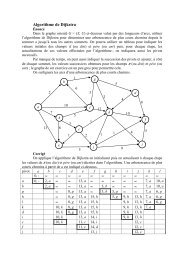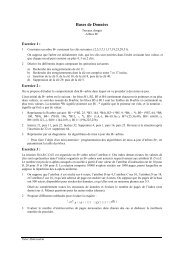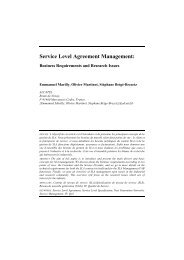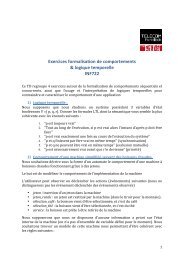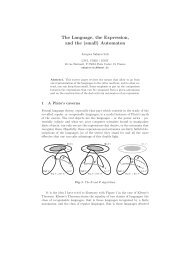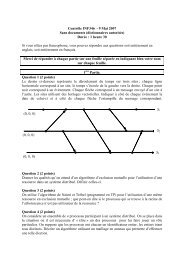- Page 1:
2012-ENST-003EDITE de ParisDoctorat
- Page 4 and 5:
Jean-Pierre Flori: Boolean function
- Page 7:
AbstractThe core of this thesis is
- Page 11 and 12:
AcknowledgmentsVladimir. — Quand
- Page 13 and 14:
ContentsList of symbols and notatio
- Page 15 and 16:
Contentsxv4 Efficient characterizat
- Page 17 and 18:
List of figures1.1 The filter model
- Page 19 and 20:
List of symbols and notationGeneral
- Page 21 and 22:
List of symbols and notationxxil(t)
- Page 23 and 24:
List of symbols and notationxxiiidi
- Page 25:
List of symbols and notationxxvu
- Page 28 and 29:
2 Introduction1 Mathematics and cry
- Page 30 and 31:
4 Introductiongiving more general b
- Page 33 and 34:
Chapter 1Boolean functions incrypto
- Page 35 and 36:
1.1. Cryptographic criteria for Boo
- Page 37 and 38:
1.2. Families of Boolean functions
- Page 39 and 40:
1.2. Families of Boolean functions
- Page 41 and 42:
1.2. Families of Boolean functions
- Page 43:
1.2. Families of Boolean functions
- Page 46 and 47: 20 Chapter 2. On a conjecture about
- Page 48 and 49: 22 Chapter 2. On a conjecture about
- Page 50 and 51: 24 Chapter 2. On a conjecture about
- Page 52 and 53: 26 Chapter 2. On a conjecture about
- Page 54 and 55: 28 Chapter 2. On a conjecture about
- Page 56 and 57: 30 Chapter 2. On a conjecture about
- Page 58 and 59: 32 Chapter 2. On a conjecture about
- Page 60 and 61: 34 Chapter 2. On a conjecture about
- Page 62 and 63: 36 Chapter 2. On a conjecture about
- Page 64 and 65: 38 Chapter 2. On a conjecture about
- Page 66 and 67: 40 Chapter 2. On a conjecture about
- Page 68 and 69: 42 Chapter 2. On a conjecture about
- Page 70 and 71: 44 Chapter 2. On a conjecture about
- Page 72 and 73: 46 Chapter 2. On a conjecture about
- Page 74 and 75: 48 Chapter 2. On a conjecture about
- Page 76 and 77: 50 Chapter 2. On a conjecture about
- Page 78 and 79: 52 Chapter 2. On a conjecture about
- Page 80 and 81: 54 Chapter 2. On a conjecture about
- Page 82 and 83: 56 Chapter 2. On a conjecture about
- Page 84 and 85: 58 Chapter 2. On a conjecture about
- Page 86 and 87: 60 Chapter 2. On a conjecture about
- Page 88 and 89: 62 Chapter 2. On a conjecture about
- Page 90 and 91: 64 Chapter 2. On a conjecture about
- Page 92 and 93: 66 Chapter 2. On a conjecture about
- Page 94 and 95: 68 Chapter 2. On a conjecture about
- Page 98 and 99: 72 Chapter 2. On a conjecture about
- Page 100 and 101: 74 Chapter 2. On a conjecture about
- Page 102 and 103: 76 Chapter 2. On a conjecture about
- Page 104 and 105: 78 Chapter 2. On a conjecture about
- Page 106 and 107: 80 Chapter 2. On a conjecture about
- Page 108 and 109: 82 Chapter 2. On a conjecture about
- Page 110 and 111: 84 Chapter 2. On a conjecture about
- Page 112 and 113: 86 Chapter 2. On a conjecture about
- Page 114 and 115: 88 Chapter 2. On a conjecture about
- Page 116 and 117: 90 Chapter 2. On a conjecture about
- Page 119: Part IIBent functions and pointcoun
- Page 122 and 123: 96 Chapter 3. Bent functions and al
- Page 124 and 125: 98 Chapter 3. Bent functions and al
- Page 126 and 127: 100 Chapter 3. Bent functions and a
- Page 128 and 129: 102 Chapter 3. Bent functions and a
- Page 130 and 131: 104 Chapter 3. Bent functions and a
- Page 132 and 133: 106 Chapter 3. Bent functions and a
- Page 134 and 135: 108 Chapter 3. Bent functions and a
- Page 136 and 137: 110 Chapter 4. Efficient characteri
- Page 138 and 139: 112 Chapter 4. Efficient characteri
- Page 140 and 141: 114 Chapter 4. Efficient characteri
- Page 142 and 143: 116 Chapter 4. Efficient characteri
- Page 144 and 145: 118 Chapter 4. Efficient characteri
- Page 146 and 147:
120 Chapter 4. Efficient characteri
- Page 148 and 149:
122 Chapter 4. Efficient characteri
- Page 150 and 151:
124 Chapter 4. Efficient characteri
- Page 152 and 153:
126 Chapter 4. Efficient characteri
- Page 155:
Part IIIComplex multiplication and
- Page 158 and 159:
132 Chapter 5. Complex multiplicati
- Page 160 and 161:
134 Chapter 5. Complex multiplicati
- Page 162 and 163:
136 Chapter 5. Complex multiplicati
- Page 164 and 165:
138 Chapter 5. Complex multiplicati
- Page 166 and 167:
140 Chapter 5. Complex multiplicati
- Page 168 and 169:
142 Chapter 5. Complex multiplicati
- Page 170 and 171:
144 Chapter 5. Complex multiplicati
- Page 172 and 173:
146 Chapter 5. Complex multiplicati
- Page 174 and 175:
148 Chapter 5. Complex multiplicati
- Page 176 and 177:
150 Chapter 5. Complex multiplicati
- Page 178 and 179:
152 Chapter 5. Complex multiplicati
- Page 180 and 181:
154 Chapter 5. Complex multiplicati
- Page 182 and 183:
156 Chapter 5. Complex multiplicati
- Page 185 and 186:
Chapter 6Complex multiplication in
- Page 187 and 188:
6.1. Abelian varieties 1616.1 Abeli
- Page 189 and 190:
6.1. Abelian varieties 163Theorem 6
- Page 191 and 192:
6.1. Abelian varieties 165A homomor
- Page 193 and 194:
6.1. Abelian varieties 1676.1.5 Hom
- Page 195 and 196:
6.2. Class groups and units 169The
- Page 197 and 198:
6.2. Class groups and units 171in [
- Page 199 and 200:
6.3. Complex multiplication 173If t
- Page 201 and 202:
6.3. Complex multiplication 175•
- Page 203 and 204:
6.3. Complex multiplication 177We h
- Page 205 and 206:
6.3. Complex multiplication 179pola
- Page 207 and 208:
6.4. Class polynomials for genus 2
- Page 209 and 210:
6.4. Class polynomials for genus 2
- Page 211:
Appendices
- Page 214 and 215:
Table A.3: Coefficients for d = 3,
- Page 216 and 217:
Table A.8: Coefficients for d = 8,
- Page 218 and 219:
192 Bibliography[13] Elwyn Ralph Be
- Page 220 and 221:
194 Bibliography[42] Claude Carlet,
- Page 222 and 223:
196 Bibliography[72] Cunsheng Ding,
- Page 224 and 225:
198 Bibliography[102] David Freeman
- Page 226 and 227:
200 Bibliography[132] Marc Hindry a
- Page 228 and 229:
202 Bibliography[161] Philippe Lang
- Page 230 and 231:
204 Bibliography[191] Willi Meier a
- Page 232 and 233:
206 Bibliography[222] Oscar Seymour
- Page 234 and 235:
208 Bibliography[254] Marco Streng.
- Page 236 and 237:
210 Bibliography[286] Chia-Fu Yu. T
- Page 238 and 239:
212 IndexForm class group . . . . .
- Page 240 and 241:
214 IndexKKloosterman sum . . . . .
- Page 243 and 244:
Résumé longFauĆ.Werd’ iĚ beru
- Page 245 and 246:
1. Des fonctions booléennes et d
- Page 247 and 248:
1. Des fonctions booléennes et d
- Page 249 and 250:
1. Des fonctions booléennes et d
- Page 251 and 252:
1. Des fonctions booléennes et d
- Page 253 and 254:
2. Fonctions courbes et comptage de
- Page 255 and 256:
2. Fonctions courbes et comptage de
- Page 257 and 258:
2. Fonctions courbes et comptage de
- Page 259 and 260:
2. Fonctions courbes et comptage de
- Page 261 and 262:
3. Multiplication complexe et polyn
- Page 263 and 264:
3. Multiplication complexe et polyn
- Page 265 and 266:
3. Multiplication complexe et polyn
- Page 267:
3. Multiplication complexe et polyn



